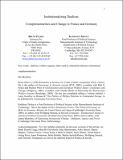Institutionalizing Dualism: Complementarities and Change in France and Germany
Author(s)
Thelen, Kathleen; Palier, Bruno
DownloadThelen_Institutionalising dualism.pdf (284.8Kb)
OPEN_ACCESS_POLICY
Open Access Policy
Creative Commons Attribution-Noncommercial-Share Alike
Terms of use
Metadata
Show full item recordAbstract
The French and German political economies have been significantly reconfigured over the past two decades. Although the changes have often been more piecemeal than revolutionary, their cumulative effects are profound. The authors characterize the changes that have taken place as involving the institutionalization of new forms of dualism and argue that what gives contemporary developments a different character from the past is that dualism is now explicitly underwritten by state policy. They see this outcome as the culmination of a sequence of developments, beginning in the field of industrial relations, moving into labor market dynamics, and finally finding institutional expression in welfare state reforms. Contrary to theoretical accounts that suggest that institutional complementarities support stability and institutional reproduction, the authors argue that the linkages across these realms have helped to translate employer strategies that originated in the realm of industrial relations into a stable, new, and less egalitarian model with state support.
Date issued
2010-02Department
Massachusetts Institute of Technology. Department of Political ScienceJournal
Politics & Society
Publisher
Sage Publications
Citation
Palier, B., and K. Thelen. “Institutionalizing Dualism: Complementarities and Change in France and Germany.” Politics & Society 38, no. 1 (February 10, 2010): 119-148.
Version: Original manuscript
ISSN
0032-3292